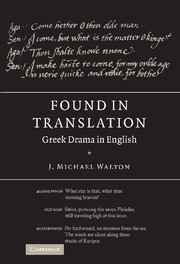Book contents
- Frontmatter
- Contents
- Acknowledgements
- Introduction: ‘Summon the Presbyterians’
- 1 Finding Principles, Finding a Theory
- 2 Historical Perspectives: Lumley to Lennox
- 3 Aeschylus and the Agamemnon: Gilding the Lily
- 4 Translating the Mask: the Non-Verbal Language
- 5 Sophocles' Oedipus Tyrannus: Words and Concepts
- 6 Text and Subtext: From Bad to Verse
- 7 Euripides' Medea and Alcestis: From Sex to Sentiment
- 8 The Comic Tradition
- 9 Modernising Comedy
- 10 When is a Translation Not a Translation?
- Appendix: A Comprehensive List of all Greek Plays in English Translation
- Notes
- Select Bibliography
- Index of Translators
- General Index
3 - Aeschylus and the Agamemnon: Gilding the Lily
Published online by Cambridge University Press: 04 December 2009
- Frontmatter
- Contents
- Acknowledgements
- Introduction: ‘Summon the Presbyterians’
- 1 Finding Principles, Finding a Theory
- 2 Historical Perspectives: Lumley to Lennox
- 3 Aeschylus and the Agamemnon: Gilding the Lily
- 4 Translating the Mask: the Non-Verbal Language
- 5 Sophocles' Oedipus Tyrannus: Words and Concepts
- 6 Text and Subtext: From Bad to Verse
- 7 Euripides' Medea and Alcestis: From Sex to Sentiment
- 8 The Comic Tradition
- 9 Modernising Comedy
- 10 When is a Translation Not a Translation?
- Appendix: A Comprehensive List of all Greek Plays in English Translation
- Notes
- Select Bibliography
- Index of Translators
- General Index
Summary
A translator's best hope, I think, and still the hardest to achieve, is Dryden's hope that his author will speak the living language of the day.
(Robert Fagles, Foreword to Aeschylus' Oresteia)In Terence Rattigan's one-act play, The Browning Version, there is an early encounter between the schoolmaster, Frank Hunter, and the reluctant classicist pupil John Taplow:
taplow (protestingly): I'm extremely interested in science, sir.
frank: Are you? I'm not. Not, at least, in the science I have to teach.
taplow: Well, anyway, sir, it's a great deal more exciting than this muck. (Indicating his book.)
frank: What is this muck?
taplow: Aeschylus, sir. The Agamemnon.
frank: And your considered view is that the Agamemnon of Aeschylus is muck, is it?
taplow: Well, no, sir. I don't think the play is muck – exactly. I suppose, in a way, it's rather a good play, really, a wife murdering her husband and having a lover and all that. I only mean the way it's taught to us – just a lot of Greek words strung together …
A little later in the play the teacher of Greek, Andrew Crocker-Harris, during whose final hours at the school the play takes place, begins a translation session with Taplow. Taplow's free rendering of the Chorus's confrontation with Clytemnestra is treated with some scorn by Andrew:
andrew: Then why do you invent words that are simply not there?
taplow: I thought they sounded better, sir. More exciting. After all she did kill her husband, sir. (With relish.) […]
- Type
- Chapter
- Information
- Found in TranslationGreek Drama in English, pp. 43 - 61Publisher: Cambridge University PressPrint publication year: 2006



